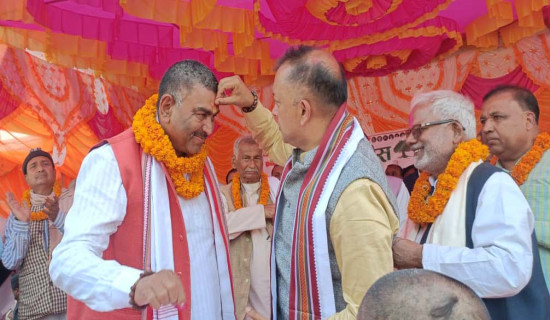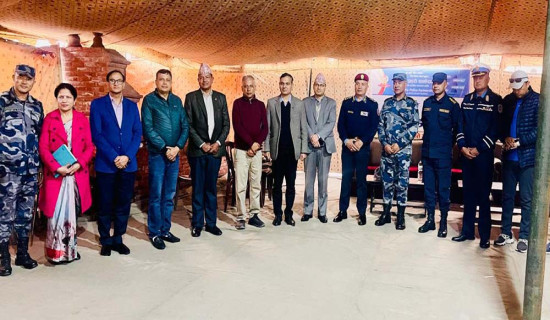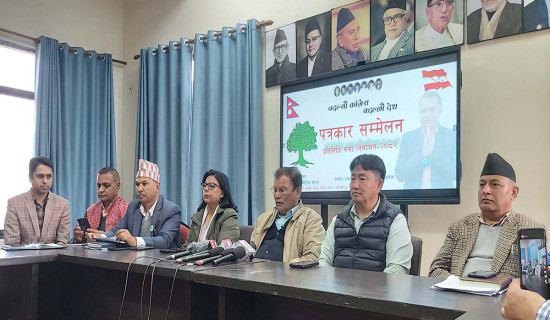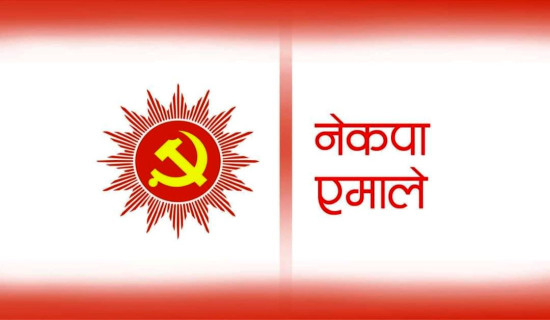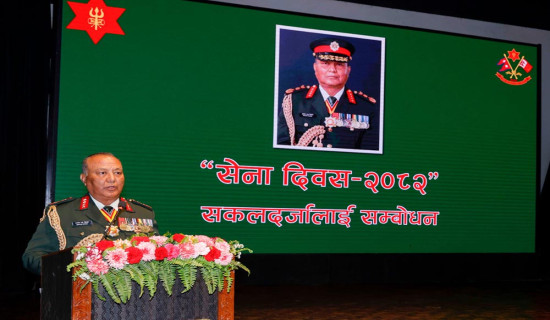- Sunday, 15 February 2026
Nepal's Quest For Foreign Investment
Nepal is on the path to graduating from the category of least developed countries (LDCs). Similarly, by 2043, Nepal is expected to achieve the status of a prosperous country with a per capita income of $12,100. Achieving the Sustainable Development Goals (SDGs) is a challenging task for Nepal. A government report suggests that Nepal needs to invest around 19 billion US dollars (Nrs. 2025 billion) per year to achieve the United Nations' Sustainable Development Goals by 2030. The government's financial strain in this scenario highlights the critical importance of foreign direct investment. Nepal's pursuit of foreign investment has evolved significantly over time. The country has implemented various policies, institutional reforms, and activities to attract investment. However, the investment gap remains substantial in certain years.
Even if Nepal intends to utilise a significant portion of its domestic savings, it appears unlikely to meet its investment targets. Moreover, economists highlight the risk of crowding out in the economy. In this context, Nepal should prioritise resolving the bottlenecks in the investment sector to attract foreign direct investment (FDI). Various investment summits, international appeals, and agreements such as bilateral investment promotion and protection agreements (BIPPA) and double taxation avoidance agreements (DTAA) demonstrate efforts to create an investment-friendly environment. Despite favourable policies and institutions, it does not seem to achieve the expected results.
The third investment summit, a significant event held in Kathmandu in April 2024, showcased 151 projects for investment. Among the showcased projects, the Investment Board Nepal (IBN) tried to find investors for 12 projects under its jurisdiction, but only two projects could get a letter of intent (LOI) from the investors. It’s not only a bitter experience for investment promotion. Even previous investment summits also couldn’t yield satisfactory results; the first two summits saw a significant disparity between the promised investments and the actual funds received. Despite giant commitments of 1400 billion and 1500 billion at the first two summits, the actual amounts realised were a mere 200 billion and 100 billion, respectively.
Developing countries like China and Vietnam are attracting a lot of foreign investment from world-known companies. In developing countries like China, Starbucks, McDonald's, KFC, and 7-Eleven stores can be found everywhere. Which can be seen in developed countries like Japan, Australia, etc. This is a good sign for investors. Nepal needs to analyse why investors are not widely encouraged to invest in Nepal.
The UN's World Investment Report 2023 indicates a global decline in foreign investment in recent years.
This trend may be attributed to the effects of the COVID-19 pandemic and the subsequent economic slowdown. The amount of money invested each year has dropped to about $4 trillion. Global problems like the COVID-19 pandemic have made it harder for businesses to invest and reduced the amount of money they invest. This decline is especially bad for less developed countries like Nepal.
The World Bank's data reveals that South Asia receives approximately 20 per cent of global investment, while Nepal receives a mere 0.3 per cent. This is insignificant compared to countries like China and India, and even lower compared to Bangladesh and Sri Lanka. This implies that Nepal needs to substantially improve its governance and infrastructure to attract investment. Nepal Rastra Bank conducted studies that highlight the shortcomings in Nepal's investment climate.
A study conducted by South Asia Watch on Trade, Economics & Environment (SAWTEE) around 2013 identified infrastructure, electricity supply, and governance as major issues. At that time, load shedding and labour strikes were indicated as reasons for the lack of FDI. Despite improvements in electricity supply and labour laws, the ongoing decline in FDI shows that there are other areas that Nepal needs to address. There are still unresolved issues related to dedicated and trunk line fee payments in some industries.
Investors always want to make money over the long term. They don't just look at the government's contemporary policies but also try to analyse what the government will do in the next 30-40 years. Investors surely check the current laws and policies made by the government to see whether it provides good opportunities to make money. Furthermore, they also look at how past economic policies are affecting the benefits given in recent years. Investors also pay attention to if the policies about investment, industry, and trade are consistently working or changing frequently. If political parties understand investment and have a long-term vision, that paves a golden way for an investment climate.
Industrial infrastructure, domestic and international connectivity, service roads, energy efficiency, energy costs, and comparative advantages in these areas significantly influence investors' decisions. In a globalised world, investment flows to regions where it can yield high returns. Foreign investors, equipped with their own research mechanisms, carefully analyse these factors before investing. Additionally, market accessibility, niche market segments, and logistical costs facilitate investment. While labour laws may have provisions like 'no work, no pay', still there is a shortage of skilled and responsible human resources. The lack of a sustainable political culture raises concerns about the potential risk of strike from labour unions affiliated with certain political parties.
The government's perspective on the private sector and the level playing field falls under the governance aspect. Ease of entry, ownership transfer, and exit, along with simplified regulations, are equally important things investors look for. For example, it is said that investment approval takes only one day in Malaysia. Although Nepal's Foreign Investment and Technology Transfer Act 2075 mandates approval within seven days, there are complaints about applications remaining pending for years. It is a reality that one needs to approach several agencies to complete the process. For instance, an investor in the hydroelectric sector primarily has to visit the Department of Industry (DOI), Department of Electricity Development (DOED), and Investment Board Nepal. One of the investors was complaining that the DOI asks for a generation license for industry registration, and DOED asks for an industry registration certificate to issue a generation license. Here, overwhelmingly, it seems a procedural problem. There is sophisticated provision of a one-window system and a public-private partnership unit in laws; they have not been implemented effectively.
The success or failure of the private sector, driven by domestic investment, is a significant factor. Domestic investment can reflect potential investment climate; hence, there is a significant importance of a healthy domestic industrial sector and a strong traditional industrial heritage. The success of small and medium-sized enterprises in countries like Sri Lanka, Vietnam, and Bangladesh has played a crucial role in building confidence among foreign investors.
Nepal needs to make targeted interventions in the areas mentioned above, taking into account its geographical realities and comparative advantages sectors. Firstly, there is a need to create a conducive political environment for investment and industry, focusing on demographic advantages and sustainable development goals.
There is a need to consolidate and simplify investment-related policies and laws through Parliament. Recently, Parliament amended some laws in investment sectors to make them more foreign investment friendly. It needs to wait and see for the actual implications of these amendments.
Nepal, a federal country with three tiers of government, should focus on coordinating its efforts to achieve sustainable development goals and the ambitious vision of becoming a prosperous nation by 2100 Bikram Sambat.
This also includes a smooth transition from the status of a least developed country (LDC). For ensuring all these goals, the creation of a favourable environment for foreign investments is crucial.
(An MBA from International University of Japan, Bhattarai now works at the Ministry of Defense.)










